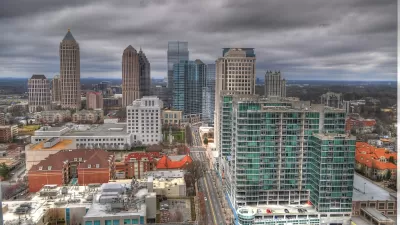Anthony Flint discusses how "Silicon Valley-level innovative thinking" is making zoning more exciting than, well, anyone ever thought zoning codes could be.
"The problem," according to Anthony Flint, "is that most zoning hasn’t changed with the times, for nearly a century now. It’s like having traffic rules and manufacturer regulations based on the Model T."
After describing the history of zoning from the separation of uses through recent innovations like form-based codes, Flint introduces performance-based codes, of which an early example comes from the San Francisco Bay Area:
"Some of the most out-of-the-box thinking is coming from (where else?) the Bay Area, with the adoption of 'performance-based zoning.' In the city of Fremont, the city council chose a new path for a nearly 900-acre parcel anchored by a future BART station, set for massive redevelopment. Planners started with a set of goals—a certain number of jobs, a certain number of homes including affordable homes, and critically, strict standards for a low carbon footprint. However developers achieve all that is their business."
The performance-based approach is also being tested in Atlanta.
FULL STORY: Braving the New World of Performance-Based Zoning

Maui's Vacation Rental Debate Turns Ugly
Verbal attacks, misinformation campaigns and fistfights plague a high-stakes debate to convert thousands of vacation rentals into long-term housing.

Planetizen Federal Action Tracker
A weekly monitor of how Trump’s orders and actions are impacting planners and planning in America.

In Urban Planning, AI Prompting Could be the New Design Thinking
Creativity has long been key to great urban design. What if we see AI as our new creative partner?

King County Supportive Housing Program Offers Hope for Unhoused Residents
The county is taking a ‘Housing First’ approach that prioritizes getting people into housing, then offering wraparound supportive services.

Researchers Use AI to Get Clearer Picture of US Housing
Analysts are using artificial intelligence to supercharge their research by allowing them to comb through data faster. Though these AI tools can be error prone, they save time and housing researchers are optimistic about the future.

Making Shared Micromobility More Inclusive
Cities and shared mobility system operators can do more to include people with disabilities in planning and operations, per a new report.
Urban Design for Planners 1: Software Tools
This six-course series explores essential urban design concepts using open source software and equips planners with the tools they need to participate fully in the urban design process.
Planning for Universal Design
Learn the tools for implementing Universal Design in planning regulations.
planning NEXT
Appalachian Highlands Housing Partners
Mpact (founded as Rail~Volution)
City of Camden Redevelopment Agency
City of Astoria
City of Portland
City of Laramie




























